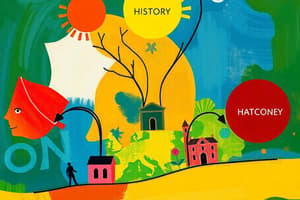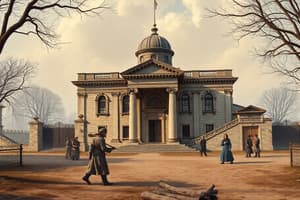Podcast
Questions and Answers
What is the primary focus of political history?
What is the primary focus of political history?
- Art and cultural practices
- Economic systems and practices
- Social experiences of individuals
- Governance, political movements, and state affairs (correct)
Which of the following is considered a primary source?
Which of the following is considered a primary source?
- Diaries from the time being studied (correct)
- Scholarly articles analyzing events
- Documentary films
- History textbooks
What characterizes the Renaissance period?
What characterizes the Renaissance period?
- Military conquests and battles
- The absence of written records
- A cultural rebirth emphasizing art, science, and humanism (correct)
- The rise of feudalism
What does historiography study?
What does historiography study?
Which historical period is characterized by the absence of written records?
Which historical period is characterized by the absence of written records?
Which historian is often referred to as the 'Father of History'?
Which historian is often referred to as the 'Father of History'?
What is one of the main goals of studying history?
What is one of the main goals of studying history?
Which interpretation of history focuses on class struggle?
Which interpretation of history focuses on class struggle?
Flashcards are hidden until you start studying
Study Notes
Overview of History
- History is the study of past events, societies, and cultures.
- It encompasses a chronological record of significant occurrences, often focusing on human activity.
Branches of History
- Political History: Focuses on events related to governance, political movements, and state affairs.
- Social History: Examines the lived experiences of individuals and communities.
- Economic History: Studies economic practices and the impact of economic systems over time.
- Cultural History: Investigates cultural practices, art, religion, and beliefs throughout different eras.
- Military History: Explores wars, battles, and military strategies.
Methodology
- Primary Sources: Original documents (letters, diaries, official records) from the time being studied.
- Secondary Sources: Interpretations and analyses of primary sources (history books, articles).
- Historiography: The study of how history has been written and the different perspectives over time.
Key Historical Periods
- Prehistory: Time before written records (Stone Age, Bronze Age).
- Ancient History: Civilizations such as Mesopotamia, Egypt, Greece, and Rome.
- Middle Ages: Also known as the Medieval period; characterized by feudalism and the rise of kingdoms.
- Renaissance: A cultural rebirth emphasizing art, science, and humanism.
- Modern History: Encompasses events from the late 15th century to the present, including revolutions, industrialization, and globalization.
Important Concepts
- Cause and Effect: Understanding why events occurred and their consequences.
- Continuity and Change: Analyzing what has stayed the same versus what has evolved.
- Historical Context: Recognizing the circumstances surrounding historical events.
Notable Historians
- Herodotus: Often called the "Father of History"; known for his work on the Greco-Persian Wars.
- Thucydides: Focused on the Peloponnesian War and introduced critical analysis.
- Will Durant: Known for "The Story of Civilization," a multi-volume work.
Importance of History
- Provides insights into current societies and cultures.
- Helps in understanding different perspectives and values.
- Aids in critical thinking and analytical skills.
Common Historical Interpretations
- Marxist History: Focus on class struggle and economic factors.
- Feminist History: Examines women's roles and contributions throughout history.
- Postcolonial History: Analyzes the effects of colonialism and the perspectives of colonized peoples.
Resources for Further Study
- Books: Works by historians covering various eras and themes in history.
- Documentaries: Visual storytelling of historical events and figures.
- Online Databases: Access to archives, articles, and primary source collections.
History: The Study of the Past
- History explores past events, societies, and cultures, offering a chronological record of significant occurrences, often focusing on human activity.
Branches of History
- Political history examines governance, political movements, and state affairs.
- Social history delves into the lived experiences of individuals and communities.
- Economic history studies economic practices and the impact of economic systems over time.
- Cultural history investigates cultural practices, art, religion, and beliefs throughout different eras.
- Military history explores wars, battles, and military strategies.
Methodology
- Primary sources are original documents from the time being studied, such as letters, diaries, and official records.
- Secondary sources interpret and analyze primary sources, including history books and articles.
- Historiography studies how history has been written and different perspectives over time.
Key Historical Periods
- Prehistory encompasses the period before written records, including the Stone Age and Bronze Age.
- Ancient history focuses on civilizations such as Mesopotamia, Egypt, Greece, and Rome.
- Middle Ages (Medieval period) is characterized by feudalism and the rise of kingdoms.
- Renaissance marks a cultural rebirth emphasizing art, science, and humanism.
- Modern history covers events from the late 15th century to the present, including revolutions, industrialization, and globalization.
Important Concepts
- Cause and effect involves understanding why events occurred and their consequences.
- Continuity and change analyzes what has stayed the same versus what has evolved over time.
- Historical context recognizes the circumstances surrounding historical events.
Notable Historians
- Herodotus, known as the "Father of History," documented the Greco-Persian Wars.
- Thucydides focused on the Peloponnesian War and introduced critical analysis.
- Will Durant is known for "The Story of Civilization", a multi-volume work.
The Importance of History
- History provides insights into current societies and cultures.
- It helps in understanding different perspectives and values.
- History aids in critical thinking and analytical skills.
Common Historical Interpretations
- Marxist history focuses on class struggle and economic factors.
- Feminist history examines women's roles and contributions throughout history.
- Postcolonial history analyzes the effects of colonialism and the perspectives of colonized peoples.
Resources for Further Study
- Books written by historians cover various eras and themes in history.
- Documentaries provide visual storytelling of historical events and figures.
- Online databases offer access to archives, articles, and primary source collections.
Studying That Suits You
Use AI to generate personalized quizzes and flashcards to suit your learning preferences.




